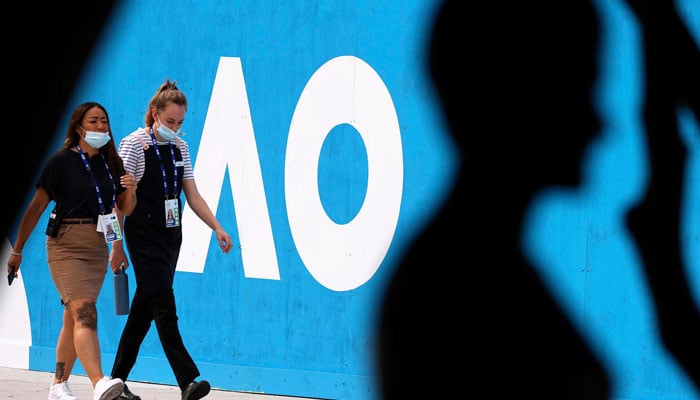Virus, isolation and complaints: chaotic build-up to Aussie Open
MELBOURNE: The Australian Open has endured a rocky build-up during the coronavirus pandemic.
The country’s largest sporting event’s latest setback saw hundreds of players and officials ordered into isolation after a positive Covid-19 case at a tournament hotel, meaning all play was cancelled on Thursday at warm-up events.
Organisers said they were still confident the year’s first Grand Slam would start on Monday despite the continuing logistical, health and safety issues.
Here, AFP Sport looks at five issues that the year’s opening Grand Slam has faced:
- Melbourne lockdown -
Melbourne became the epicentre of the country’s coronavirus “second wave” after security bungles at quarantine hotels housing returned international travellers sparked a major outbreak in July, with new daily cases rising above 700 in August.
The city’s five million residents were placed in lockdown for nearly four months under onerous restrictions.
It forced major sports such as Australian Rules football and rugby league to relocate away from Melbourne. But tennis boss Craig Tiley remained adamant the Australian Open would go ahead under bio-secure conditions.
- Three-week delay -
The Grand Slam was due to start on January 18, but the country’s strict quarantine rules forced Tennis Australia and the Victorian state government to find a workable agreement.
There was speculation that it might have to be delayed until March but the Australian Open was eventually moved back three weeks to February 8.
More than 1,000 players and staff arrived from January 15 on 17 charter flights to undergo a mandatory 14-day quarantine imposed on all overseas arrivals before a week of warm-up tournaments.
- Player complaints -
There had been a sticking point over allowing players to practise during the compulsory 14-day quarantine, but eventually authorities allowed them out of their rooms daily for five-hour blocks of training and treatment.
The stricter bio-secure measures, compared with last year’s US and French Opens held in cities stricken by the virus, led to some resenting the conditions.
Novak Djokovic sent a letter to Tennis Australia that reportedly called for players to be moved into private homes with tennis courts and get better meals, among other demands, while Spain’s Roberto Bautista Agut said quarantine was like prison “with wifi”.
The situation was compounded with at least 72 players barred from leaving their rooms for two weeks after coronavirus cases were detected on their flights into the country.
There was also accusations of preferential treatment after a select group — including Djokovic, Serena Williams, Naomi Osaka and Rafael Nadal — were allowed to fly into Adelaide and enjoy better facilities such as rooms with balconies.
- Public backlash -
A public furore erupted against the players flown in during a raging pandemic when thousands of Australians were stranded overseas.
The media portrayed Djokovic’s request to Tennis Australia as petulant and selfish, while Victoria Premier Daniel Andrews was forced to insist players would not have “special treatment”.
Some of those who complained about the conditions later retracted their original statements, including France’s world number 53 Alize Cornet who wrote on social media that the backlash “made me realise what you’ve been through last year and how much you suffered”.
- New case -
Preparations were thrown into further chaos on Wednesday night when it was announced a worker at one the tennis quarantine hotels had tested positive for coronavirus.
It forced more than 500 players and officials to get tested and isolate until they received their results, with Thursday’s play at the ATP Cup team competition, three WTA events and two ATP tournaments in Melbourne Park cancelled as a precaution.
Despite the setback, Tiley insisted: “We’re absolutely confident the Australian Open will go ahead.”
-
 Alix Earle And Tom Brady’s Relationship Status Revealed After Cosy Super Bowl 2026 Outing
Alix Earle And Tom Brady’s Relationship Status Revealed After Cosy Super Bowl 2026 Outing -
 Why King Charles Has ‘no Choice’ Over Andrew Problem
Why King Charles Has ‘no Choice’ Over Andrew Problem -
 Shamed Andrew Wants ‘grand Coffin’ Despite Tainting Nation
Shamed Andrew Wants ‘grand Coffin’ Despite Tainting Nation -
 Keke Palmer Reveals How Motherhood Prepared Her For 'The Burbs' Role
Keke Palmer Reveals How Motherhood Prepared Her For 'The Burbs' Role -
 King Charles Charms Crowds During Lancashire Tour
King Charles Charms Crowds During Lancashire Tour -
 ‘Disgraced’ Andrew Still Has Power To Shake King Charles’ Reign: Expert
‘Disgraced’ Andrew Still Has Power To Shake King Charles’ Reign: Expert -
 Why Prince William Ground Breaking Saudi Tour Is Important
Why Prince William Ground Breaking Saudi Tour Is Important -
 AOC Blasts Jake Paul Over Bad Bunny Slight: 'He Makes You Look Small'
AOC Blasts Jake Paul Over Bad Bunny Slight: 'He Makes You Look Small' -
 At Least 53 Dead After Migrant Boat Capsizes Off Libya
At Least 53 Dead After Migrant Boat Capsizes Off Libya -
 'God Of War' Announces Casting Major Key Role In Prime Video Show
'God Of War' Announces Casting Major Key Role In Prime Video Show -
 Real Reason Prince William, Kate Broke Silence On Andrew Scandal Revealed
Real Reason Prince William, Kate Broke Silence On Andrew Scandal Revealed -
 Drew Barrymore Responds To 'Charlie's Angels' Costar's Comments About Her
Drew Barrymore Responds To 'Charlie's Angels' Costar's Comments About Her -
 Shakira Slips Hard On Stage During Life Show
Shakira Slips Hard On Stage During Life Show -
 King Charles Speaks Out Over Andrew's Scandal: 'Stand Ready To Help Police'
King Charles Speaks Out Over Andrew's Scandal: 'Stand Ready To Help Police' -
 Dax Shepard Recalls Horrifying Accident That Almost Killed Him
Dax Shepard Recalls Horrifying Accident That Almost Killed Him -
 Logan Paul's Bodyguard Hits Fan On Super Bowl Day
Logan Paul's Bodyguard Hits Fan On Super Bowl Day




